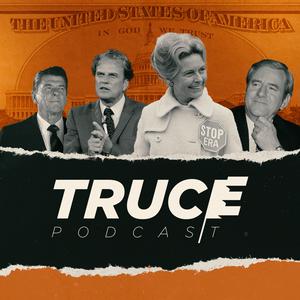Republicans and Evangelicals | George Wallace
Give to help Chris continue to make Truce
George Wallace was, as historian Dan Carter put it, "the most influential loser in American history". He was the governor of Alabama and lost multiple bids for president of the United States. In the process, he spread his racist views throughout the country.
Wallace is a vitally important figure in American history. His success in pulling in votes from racists attracted the attention of establishment politicians. He showed men like Richard Nixon that there was a significant voting bloc out there willing to vote based just on their fears about race.
In this episode, Chris speaks with historian and author Dan T. Carter about his book The Politics of Rage.
Wallace Bio (AI Generated)
George Corley Wallace Jr., born on August 25, 1919, in Clio, Alabama, rose to prominence as a controversial figure in American politics. A graduate of the University of Alabama School of Law in 1942, he served in the U.S. Army Air Forces during World War II. After the war, Wallace embarked on a political career, serving in the Alabama House of Representatives from 1947 to 1953 and as a circuit court judge until 1959. His early political endeavors were marked by a moderate stance on racial issues. However, his political trajectory shifted dramatically in the early 1960s.
In 1962, Wallace was elected governor of Alabama, campaigning on a platform of staunch segregationism. His infamous declaration, "Segregation now, segregation tomorrow, segregation forever," during his inaugural address in 1963, epitomized his commitment to maintaining racial segregation. That same year, he attempted to block the enrollment of African American students, Vivian Malone and James Hood, at the University of Alabama, an event that became known as the "Stand in the Schoolhouse Door." This act of defiance against federal desegregation efforts brought national attention to Wallace and solidified his reputation as a symbol of resistance to civil rights advancements.
Wallace's political influence extended beyond state politics. In 1968, he ran for president as the candidate of the American Independent Party, advocating for states' rights and appealing to disaffected white voters. He carried five Southern states and secured 13.5% of the national vote, demonstrating significant support for his segregationist views on a national scale. Despite his presidential aspirations, Wallace's influence remained strongest in Alabama, where he served multiple non-consecutive terms as governor.
A pivotal moment in Wallace's life occurred in 1972 during his campaign for the Democratic presidential nomination. While campaigning in Laurel, Maryland, he was shot by Arthur Bremer, leaving him permanently paralyzed from the waist down. Despite this setback, Wallace returned to Alabama politics, winning the gubernatorial election in 1974. His later years in office were characterized by a shift in his political ideology, as he sought to distance himself from his earlier segregationist positions.
Sources:
The Politics of Rage by Dan T. Carter
National Park Service article about the 16th Street Baptist Church
Curtis LeMary's announcement speech
History.com article about George Wallace being shot
Nixon Library audio tapes collection
Nixon talking about Wallace on tape
Rolling Stone magazine, October 24, 1974, “The Ministry of George Wallace” by Joe Klein.
Questions:
Had you heard of George Wallace before?
Why was Wallace important?
How did Wallace's moderate successes change politics in his era?
One prominent person speaking negatively about another race can significantly impact public opinion. How could his bloviating give permission to white people in the north to be openly racist?
Learn more about your ad choices. Visit podcastchoices.com/adchoices



